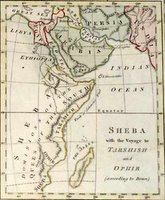
The story of the
Queen of Sabah is one of those cases where true is marred by legends. Despite of being mentioned in many ancient writings, the authentic identity of this woman is still unknown.
The storySeveral
Holy books, such as Judaic Bible, Islamic Quran and Ethiopian Kebra Nagast tell about a queen who ruled in the southern Kingdom of Sabah (or Sheba in Hebraic) with great kill, as she was loved and feared by her people. It is told that "she lived with luxury, and she had a magnificent throne" (Coran, 27). Personally she was very brune, and beautiful, but also with a strong will.
Even when no name is ever given to her (although Ethiopian tradition calls her Makeda, and Arab calls her Bilqis), Judaic texts mention that the queen heard from the greatness of
King Solomon and decided to visit him, carrying with her big amounts of spices, gems and gold as a gift. She could even have been invited by Solomon himself.
Different versions agree that during her 6-months stay in Israel, Solomon made use of his seduction arts towards her, by which he was well known (this charming sir had more than 700 wifes and concubines). According to the Judaic Bible, she was so impressed by his culture that in the end she converted to Judaism and set this religion in her homeland when she returned. Ethiopian tradition affirms that from the union of both a child was born, whose name Menelik, who, at his mother's death, was the first of an extraordinary long dinasty that ruled Ethiopia, lasting to the popular emperor
Halie Selassie and his descendents.
However, scarce archaeological evidences make it very hard to know the true story of this queen. How could someone, who takes such an important role in legends and Holy writings, leave so few traces of her existence?
The HistoryLet us see. What does seem certain is that in the X century BC, as Israel reached the maximum of its cultural and political power under Solomon's rule, there was a kingdom at the gates of the
Red Sea w

hich occupied a great part of current Yemen, and probably coastal regions of the Horn of Africa.
Sources different from the already mentioned say that the city of Tyre "traded with the merchants of Sabah and Ramah: first quality spices and every kind of gems and gold they gave for their goods" (Ezechiel, 27), agreeing in what the Bible mentions. Also Assyrian and Persian writings testify its existence. It seems that, despite being a much less refined culture than the Israeli one, its privileged situation confered it quite a great importance at this time.
Recent archaeological findings have shown an urban centre in
Marib, currently Yemen, at what is supposedly the heart of the ancient kingdom of Sabah. Findings in Ethiopia have not been so revealing, although the presence of semitic origin languages concentrated in the coastal zones of Ethiopia, Egypt and Somalia suggest that at least these areas probably belonged to this culture.
About the existence of the queen, the absence of a name to give her is something awful (in the historical sense). But actually, it is not really known whether she existed or not. Holy writings, so prone to allegories and myths, could perfectly have told about the queen in a symbolic meaning.
In the findings at Marib there is a temple known as Temple of Bilqis (the name given to the queen by the Arabs). Hence, maybe the queen, as it was a civilization mainly matriarchal, became a godness. It could even be, why not, that writings do not tell about the Queen of Sheba but on the Godness itself, in a symbolic meaning. However, pagan religion in this kingdom was polytheistic, so we could be just reducing the legendary queen to a simple local divinity from the supposedly capital Marib.
The fact of the visit to Solomon is not generally seen as a legendary tale, but it could also admit several meanings. The most widely accepted is the sign of a commercial treaty between the kingdoms of Israel and Sabah. Trading goods carried by the Sabaeans to Israel seem to prove it. However, it is possible instead that the king Solomon, seeing a kingdom with great commercial power but militarly inferior, would have forced a submission treaty by which Sabah would have become a mere vassal of Israel. This could give an explanation to the fact that Judaism expanded over southern Arabia and Ethiopia.
The switch of reality into legend could have happened in a natural way. King Solomon liked to be surrounded by a court of poets and singers that told the deeds of his king. These heroic songs could have become tradition, which 400 years later would have been impressed in Judaic writings, from there passed to Quran, and from there to Legend. Et voilà, the myth is over :)
